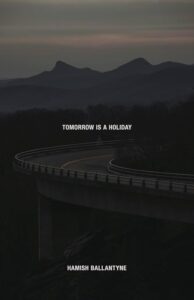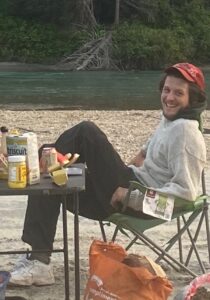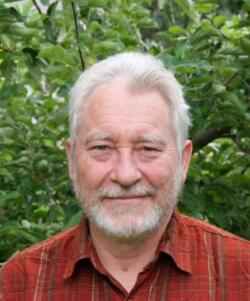Upsetting the order of things
Tomorrow is a Holiday
by Hamish Ballantyne
Vancouver: New Star Books, 2024
$16.00 / 9781554202089
Reviewed by Harold Rhenisch
*

“I like to destabilize meaning at every juncture,” Hamish Ballantyne told me when I called to talk about this first book of poems. It’s the attitude that might nudge a guy to title a book Tomorrow is a Holiday, with its fine British Columbia work culture notion that “today there is work to do, but then we’ll have the day off.” Presumably, one has earned it.
These economic and work measures are central to Ballantyne’s Vancouver and to his poetry. When he’s not out mushroom picking in the bush, he works in the Downtown East Side. “It doesn’t feel like a big city in any way,” he said. “It’s a crazed logging town under the thumb of development capital, at war with its inhabitants.” He loves that, by the way.
One thing about tricksters is that they see several ways at once. Take Ballantyne’s title, Tomorrow is a Holiday. It also means, “and today is a holiday, too.” In old-style Marxism, there is a working class and a middle class created by the pressures of capital and who play out the roles that their share of capital allows. Ballantyne extends the insight. “I follow one of the insights of disability studies,” he says, “which sees in disability a resistance to the brutalizing demands of capital.” To him, the title signifies hope.
Such prejudice and exclusion is as old as medieval France, as Roger Farr recently exploded in After Villon. In British Columbian history itself, the stage for the displacement Ballantyne reveals is the downtown of the work camps of late colonial and early-Canadian British Columbia. A lot of worlds come together in its ecosystem, as they do in Ballantyne’s.
“A&Ws,” for example, is a rock opera to the living rooms of the homeless of BC as well as a long exploration of one of BC’s ongoing colonial mythologies. They’re like highways, railroads, cut blocks and railroads, in a map laid, like poetry and social class, over the land. To get at this peculiar gentrification of Indigenous space, Ballantyne pulls out a Marxist toolkit and starts loosening its bolts—“we must ask why there is a skeleton on a throne / not what he’d look like with skin.”

It is a description of his political approach and of his poetic one. A&W franchises succeed by their sameness. You always know what you’re going to get, more or less, with variable local ingredients. As a trickster, Ballantyne soon shows just how unexpected and individual these repetitive concrete poetry spaces are, as he turns inside into outside: “Now you are the lit tips / of cigarettes waving / outside a party.”
Even the Marxism of Ballantyne’s poetic comrade and ancestor, Cesar Vallejo, did not so quickly sketch out such a bittersweet dance as this.
Poetically, Ballantyne has other tricks up his sleeve. If he can get away with it, he discards nouns in favour of the adjectives and verbs that formerly supported them and suddenly get to take on their roles. “Life is wattage wanted to power noun / to verb” he writes in “Though Not Dead I Feel I Am” one of the translations of San Juan de la Cruz that make up the last third of his book. It’s a free translation that takes on the simple machine of typical Industrial Age English sentences, in which language is an industrial manufacturing line or a diesel engine hammering at idle at a Vancouver crosswalk, with—
listen up by god I don’t want it
I don’t want to
I want to
die I want to die to die
to die to die and live more.
San Juan was talking about an ascension. Ballantyne is talking about a continuous process of becoming. Traffic is another word for that.
The approach includes getting industrial language (rather than industrial capital, as a twentieth-century Marxist might) out of the way. That he has to use language to dispel language—just as he uses British Columbia to dispel the city that dispels the land—is an irony not lost on him. In the book’s second section, Luthier, for example, he is confronted with a machine simulating human language. He writes: “answering machine warns you not to leave message.” It’s communication, sure. Lacking response, though, an essential half of human communication, it kills human life. There really is no point talking back to a machine.
So, of course, Ballantyne does. First, he tackles it head on by repeating street signs, as one of his other poetic ancestors, Lisa Robertson, once described Vancouver life, flashing past a bus window perhaps until they blur: “jewish bakery river tai laundromat.” Then, with language turned to a non-narrative form, like an endless succession of choices on a sushi train or fries in an A&W food chute, he deflates the machine’s illusion of universality by returning it to an ambiguous discussion of class: “the rest above our station.” This calming voice can be read in multiple ways, which allows Ballantyne to then return language to a living human breath with a simple ambiguous interjection: “shame.” The decision to live is all.
Narratively, these poems are intricate napkin doodles; and scribbled notes often confuse. There are good reasons for nouns, verbs, articles, and prepositions all showing up for work, after all. If you’re looking for accessible poems with emotional resonance, or if you just like narrative, chances are you will find here the piles of stuff and the people who build it around them that are often moved by Vancouver Law Enforcement Officers, arguably to clear the street or prevent fires or for reasons of public safety.
Like those streets, these poems are spectacular gestures but not always particularly easy or comfortable reads. For that reason, I suggest approaching them as songs, twenty-first-century buzzes of caffeine searching for life through the wrack of British Columbia washed up on the streets of its colonial capital. Found, it is held up in sudden clarity that draws no conclusions but illuminates personal and class unity, or as Ballantyne puts it in “Hansom,”
outside home hardware sobbing
ornament
shopping
To explain such serious playfulness, Ballantyne talked about the Brazilian soccer player Mané Garrincha. “Pelé was the great player,” Ballantyne told me, “but the people supported Garrincha.” He explained that Garrincha succeeded through trickery as much of the referees as the other players. “He upset the order of things.”
That describes Ballantyne’s fight against the gentrification of his city well. What eludes his integration is the binary he has set up between bush and city, both of which he loves.
After all, either British Columbia is not Vancouver or Babine Lake is and defines Vancouver as much as it is defined by it. This engine of power remains unexplored. Ballantyne’s is a social world that doesn’t much emphasize land as person. He loves the bush but comes back to the city because of people. They are his city. Not buildings, streets, developments, entertainments, work, economy, bakeries, or any other things. Just the group of people who are his world. In a way, the city becomes his bush. His bush is distressed by capital in the way human bodies and imaginations are, not in the way of persons. “All commitments come from my friends,” he said. “Everything I’ve read, I’ve read because of them.”
We should all be lucky to have such friends. With them at his back, in Tomorrow is a Holiday, Ballantyne settles in well to that larger conversation that such non-narrative B.C. poets as Jake Kennedy, Kevin McPherson, Fred Wah, and Lisa Robertson have been holding (often separately) for decades now.
We should bring them together sometime and blow the top off this place.
*

Harold Rhenisch has written thirty-four books from the Southern Interior since 1974. He won the George Ryga Prize for a memoir, The Wolves at Evelyn. His other grasslands books are Tom Thompson’s Shack and Out of the Interior. He lived for fifteen years in the South Cariboo and worked closely with photographer Chris Harris on Spirit in the Grass, Motherstone, Cariboo Chilcotin Coast, and The Bowron Lakes; and he writes the blog Okanagan-Okanogan. His The Salmon Shanties: A Cascadian Song Cycle will appear this fall. Harold lives in an old Japanese orchard on unceded Syilx Territory above Canim Bay on Okanagan Lake. [Editor’s note: Harold Rhenisch has reviewed books by Zoë Landale, Kerry Gilbert, Robert Hilles, Sho Yamagushiku, Bradley Peters, Aaron Tucker, Dale Tracy, Dominique Bernier-Cormier, Selina Boan, Joseph Dandurand, Délani Valin, Robert Bringhurst, Rayya Liebich, Sarah de Leeuw, Roger Farr, Stephan Torre, Don Gayton, and Calvin White for BCR. His book Landings was reviewed by Luanne Armstrong; The Tree Whisperer was reviewed by Adrienne Fitzpatrick.]
*
The British Columbia Review
Interim Editors, 2023-25: Trevor Marc Hughes (non-fiction), Brett Josef Grubisic (fiction)
Publisher: Richard Mackie
Formerly The Ormsby Review, The British Columbia Review is an online book review and journal service for BC writers and readers. The Advisory Board now consists of Jean Barman, Wade Davis, Robin Fisher, Barry Gough, Hugh Johnston, Kathy Mezei, Patricia Roy, Maria Tippett, and Graeme Wynn. Provincial Government Patron (since September 2018): Creative BC. Honorary Patron: Yosef Wosk. Scholarly Patron: SFU Graduate Liberal Studies. The British Columbia Review was founded in 2016 by Richard Mackie and Alan Twigg.
“Only connect.” – E.M. Forster
2 comments on “Upsetting the order of things”